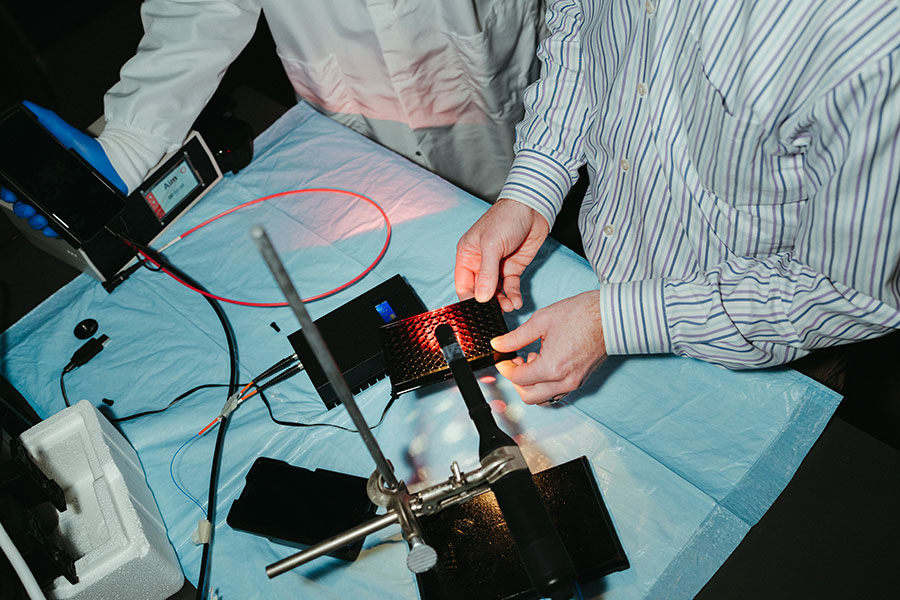Physics Professor Receives $608K in NCI Funding to Develop Medical Device for Screening and Treating Oral Cancers
In his efforts to advance the development of a low-cost, compact medical device for screening and treating oral cancers, Professor of Physics Jonathan Celli has been awarded $608,000 from the National Cancer Institute (NCI) of the National Institutes of Health (NIH). The award is part of a five-year $2.87 million multi-PI NCI cooperative agreement in collaboration with Tayyaba Hasan, professor of dermatology at Massachusetts General Hospital and Harvard Medical School, and Rongguang Liang, professor of optical sciences at the University of Arizona.
“This project aims to create an affordable, user-friendly handheld device for photodynamic therapy (PDT). The device's purpose is to screen for early signs of oral cancer, identify lesion locations, and provide immediate treatment at the point of care,” explained Celli.
Both a diagnostic and treatment tool for cancerous oral lesions, the device eradicates malignant cells through PDT, which involves using a light source in combination with light-activated medication. It is a method that has already shown great promise in treating oral cancers.

In rural India and other parts of South Asia, the high incidence of oral cancers is a major health concern. In these areas, even when early-stage cancers are detected, treatment may not be accessible to patients. When available, current care options often require patients travel long distances to receive care like radiation and chemotherapy, which involve multiple rounds of costly medical treatments and may come with debilitating side effects. A new method for managing the disease is urgently needed to address the health crisis while considering the barriers to healthcare access including infrastructure.
The PDT device is specifically designed for low resource, rural locations. In a single appointment, medical providers can use the device to both screen for oral cancer and treat malignant or pre-malignant oral lesions, offering a medical intervention for oral cancers that is more feasible and less invasive than traditional cancer care.
“This work builds on an earlier prototype device built at UMass Boston through previous NCI funding. A clinical trial in India using this device produced excellent results. Out of 29 patients with early stage oral cancer, 22 had complete tumor response in a single PDT session with our hardware. And compared to other therapies, healing was excellent, with oral mucosa returning to a shiny and healthy state after PDT. We are excited about designing and testing the next generation device to build on what we saw with the previous system,” said Celli.
Once the device is ready, the technology will then undergo testing in a Phase IIb clinical trial in India. Clinical partners in India are Moni Abraham Kuriakose, an oncologist with Karkinos Healthcare and Mazumdar Shaw Cancer Center, and Mohd Akram, a radiotherapist at Aligarh Muslim University.
UMass Boston Postdoctoral Research Associate Shakir Khan has been instrumental in the project. Graduate and undergraduate students studying biology, engineering, and physics have also participated in the project through research positions in Celli’s lab.
The research has led to a pending U.S. patent for "System and method for low cost light therapy" (PCT/US19/60723), and the launch of a startup company named Photodynamic Solutions.
Latest University News
- Congressman Lynch, Chancellor Suárez-Orozco Celebrate $1M in Federal Funding for New Offshore Workforce Development Center at UMass BostonCongressman Stephen Lynch joined UMass Boston Chancellor Marcelo Suárez-Orozco at Fox Point Dock today to announce and celebrate $1 million in federal community project funding for UMass Boston to create an Offshore Workforce Development Center.
- UMass Boston Adopts Okanagan CharterJoins Other Health Promoting Universities in Pledge
- A ‘Living Legend’: Associate Provost Rosanna DeMarco Honored by the American Nurses Association MassachusettsUMass Boston Associate Provost and Professor of Nursing Rosanna DeMarco, PhD, RN, FAAN, has been named a Living Legend in Massachusetts Nursing by the American Nurses Association Massachusetts.
- PhD Student Jacob Adamczyk Receives IMPACT Award from the American Physical SocietyThe award recognizes exceptional graduate students whose work impacts the field of data science.
- Massachusetts Attorney General and UMass Boston Applied Ethics Center Address AI Consumer ProtectionMassachusetts Attorney General Andrea Joy Campbell joined Professor of Philosophy and Director of the UMass Boston Applied Ethics Center Nir Eiskovits for a fireside chat to discuss how artificial intelligence (AI) is influencing consumer and civil rights. Postdoctoral fellow at the center, Alec Stubbs, moderated the lively discussion between Campbell and Eiskovists, which covered the risks and benefits with the emergence of AI, biases in algorithms, and data protection.
- All Girls Sports & Wellness FestivalUMass Boston is thrilled to announce our partnership with the City of Boston's Center for Youth & Families (BCYF) for the All Girls Sports and Wellness Festival!









